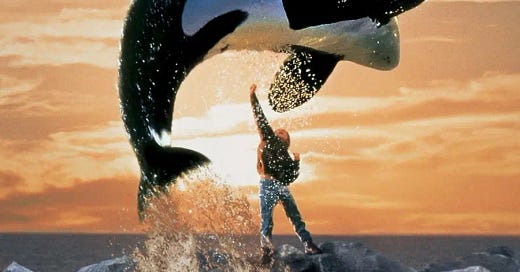Orcas, Submarines, And Violence
What The Celebration Of Destruction Says About The Way Forward
Recently, two unrelated maritime stories have dominated the news: the submarine and the orcas. To very briefly summarize: 1) A laughably inadequate tourist submersible carrying a few billionaires imploded near the bottom of the sea while attempting to give its hapless occupants a glimpse of the wreckage of the Titanic, 2) For reasons that are not fully understood, orcas have begun attacking small boats, sinking and damaging a few.
Both of these stories have provoked a range of reactions, but the dominant forms have been schadenfreude and cheerleading, respectively. Those, in turn, have met with scolding from some, who find such gleeful responses to misfortune and violence distasteful.
The reactions to these stories are two sides of the same coin. The enthusiastic response to billionaires getting crushed under the weight of the ocean—and under such idiotic and self-indulgent circumstances—is a result of widespread class resentment. Quality of life is declining for many, mostly due to the upwards redistribution of wealth into the hands of billionaires and mega-corporations. It's not hard to understand why people might be resentful of those gratuitously hoarding the wealth that was once theirs.
That some of those hoarders chose to spend their money on a vacuous tourist experience that inadvertently turned them into a thick, pink slurry at the bottom of the ocean feels like a rare instance of cosmic justice in a notably uncaring universe. That the justice was meted out imperfectly—there was some collateral damage—was insufficient to dampen the spirits of most revelers.
The celebration of the orcas are the other side of class resentment: frustration with inaction. Why isn't anyone doing something about this? Well, the orcas are, by attacking yachts, perhaps because they're angry at them over a series of collisions, or perhaps because they're super intelligent and understand on some level that humans are sterilizing the planet. Either way, someone is finally doing something about this! And they're cute.
That the orcas are not actually throwing a monkey wrench into the gears of industrial civilization is not especially important. The symbolism of their acts—wild animals victimized terribly by our cruel civilization finally fighting back—is sufficient to give us hope, even if it's half-ironic.
Of course, neither of these things—the literal liquidation of a few billionaires, nor the sinking of a handful of small boats—will actually come to anything, aside from notably funny Wikipedia entries. The reaction, however, is a weather vane. Class and climate resentment is deeper and wider than previously known. That resentment has festered long enough that there is a widespread appetite for violence. And not laser-guided violence that achieves perfect balance on the moral scale, either: people are cheering on messy, imperfect violence.
Such a sentiment can lead in a number of different directions, many of them ugly. But tsk-tsking the reaction misses the point: unless the material conditions that give rise to such profound anger improve, moralizing about it is pointless (and annoying.)
The goal should be to channel it productively. And to put it bluntly, productive action can now include violence. One major argument against violence in the service of change is that it is counterproductive: the public recoils from it, undermining the legitimacy of the movement to which it is attached. That can be true under certain circumstances, but it is not a law of the universe.
The reverse can also be true: a movement that does not engage in violence can be seen as illegitimate because it cannot win. Our present circumstances—runaway inequality and oncoming ecological doomsday—have created such conditions. If a movement is widely believed to be incapable of winning, especially because of self-defeating limits on the types of tactics it is willing to deploy, not only will it fail to gain mass support, it will foster hopelessness. We have arrived at a point where a meaningful number of people would regard the global movements against inequality and ecological collapse as more legitimate if they deployed violence. Otherwise, they do not appear capable of matching the scale and urgency of the crises they seek to resolve.
It is important that violence be deployed strategically and ethically by those seeking to improve the material conditions that give rise to its necessity, otherwise it will be deployed in much more distasteful ways.
In a situation as dire as that currently faced by humanity, there is no stopping a violent response. There is only leading by example. My hope is that those who choose to reap the support of the resentful, frustrated millions will deploy violence more effectively than orcas and more productively than undersea accidents, guided by a profound commitment to creating a more ethical civilization through their actions.
For daily updates, you can follow me on Twitter, Instagram, Bluesky, and Mastodon.





If I had to decide between either retaining the status quo, or starting a bloody revolution aimed at beheading as many billionaires and their lackeys as possible, and those were the only choices on the table, let's just say the stock prices for everything would crash heavily, except for makers of rope, scaffolding, and industrial-size blades.
So yes I agree, let's hope we can reach some better alternatives in between those two hell worlds.